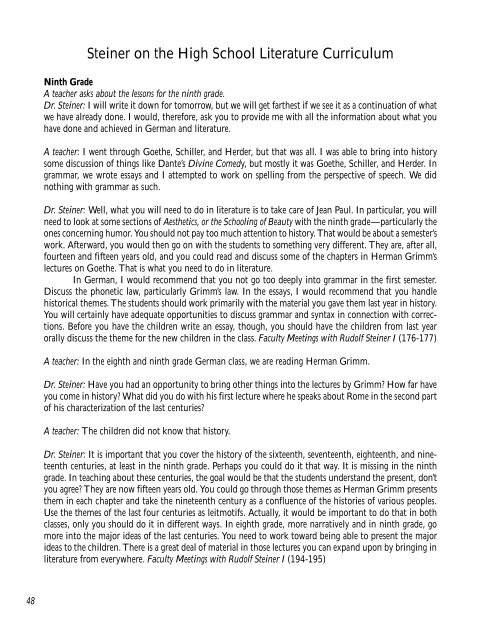Colloquium on English - Research Institute for Waldorf Education
Colloquium on English - Research Institute for Waldorf Education
Colloquium on English - Research Institute for Waldorf Education
Create successful ePaper yourself
Turn your PDF publications into a flip-book with our unique Google optimized e-Paper software.
48<br />
Steiner <strong>on</strong> the High School Literature Curriculum<br />
Ninth Grade<br />
A teacher asks about the less<strong>on</strong>s <strong>for</strong> the ninth grade.<br />
Dr. Steiner: I will write it down <strong>for</strong> tomorrow, but we will get farthest if we see it as a c<strong>on</strong>tinuati<strong>on</strong> of what<br />
we have already d<strong>on</strong>e. I would, there<strong>for</strong>e, ask you to provide me with all the in<strong>for</strong>mati<strong>on</strong> about what you<br />
have d<strong>on</strong>e and achieved in German and literature.<br />
A teacher: I went through Goethe, Schiller, and Herder, but that was all. I was able to bring into history<br />
some discussi<strong>on</strong> of things like Dante’s Divine Comedy, but mostly it was Goethe, Schiller, and Herder. In<br />
grammar, we wrote essays and I attempted to work <strong>on</strong> spelling from the perspective of speech. We did<br />
nothing with grammar as such.<br />
Dr. Steiner: Well, what you will need to do in literature is to take care of Jean Paul. In particular, you will<br />
need to look at some secti<strong>on</strong>s of Aesthetics, or the Schooling of Beauty with the ninth grade—particularly the<br />
<strong>on</strong>es c<strong>on</strong>cerning humor. You should not pay too much attenti<strong>on</strong> to history. That would be about a semester’s<br />
work. Afterward, you would then go <strong>on</strong> with the students to something very different. They are, after all,<br />
fourteen and fifteen years old, and you could read and discuss some of the chapters in Herman Grimm’s<br />
lectures <strong>on</strong> Goethe. That is what you need to do in literature.<br />
In German, I would recommend that you not go too deeply into grammar in the first semester.<br />
Discuss the ph<strong>on</strong>etic law, particularly Grimm’s law. In the essays, I would recommend that you handle<br />
historical themes. The students should work primarily with the material you gave them last year in history.<br />
You will certainly have adequate opportunities to discuss grammar and syntax in c<strong>on</strong>necti<strong>on</strong> with correcti<strong>on</strong>s.<br />
Be<strong>for</strong>e you have the children write an essay, though, you should have the children from last year<br />
orally discuss the theme <strong>for</strong> the new children in the class. Faculty Meetings with Rudolf Steiner I (176-177)<br />
A teacher: In the eighth and ninth grade German class, we are reading Herman Grimm.<br />
Dr. Steiner: Have you had an opportunity to bring other things into the lectures by Grimm? How far have<br />
you come in history? What did you do with his first lecture where he speaks about Rome in the sec<strong>on</strong>d part<br />
of his characterizati<strong>on</strong> of the last centuries?<br />
A teacher: The children did not know that history.<br />
Dr. Steiner: It is important that you cover the history of the sixteenth, seventeenth, eighteenth, and nineteenth<br />
centuries, at least in the ninth grade. Perhaps you could do it that way. It is missing in the ninth<br />
grade. In teaching about these centuries, the goal would be that the students understand the present, d<strong>on</strong>’t<br />
you agree? They are now fifteen years old. You could go through those themes as Herman Grimm presents<br />
them in each chapter and take the nineteenth century as a c<strong>on</strong>fluence of the histories of various peoples.<br />
Use the themes of the last four centuries as leitmotifs. Actually, it would be important to do that in both<br />
classes, <strong>on</strong>ly you should do it in different ways. In eighth grade, more narratively and in ninth grade, go<br />
more into the major ideas of the last centuries. You need to work toward being able to present the major<br />
ideas to the children. There is a great deal of material in those lectures you can expand up<strong>on</strong> by bringing in<br />
literature from everywhere. Faculty Meetings with Rudolf Steiner I (194-195)

















